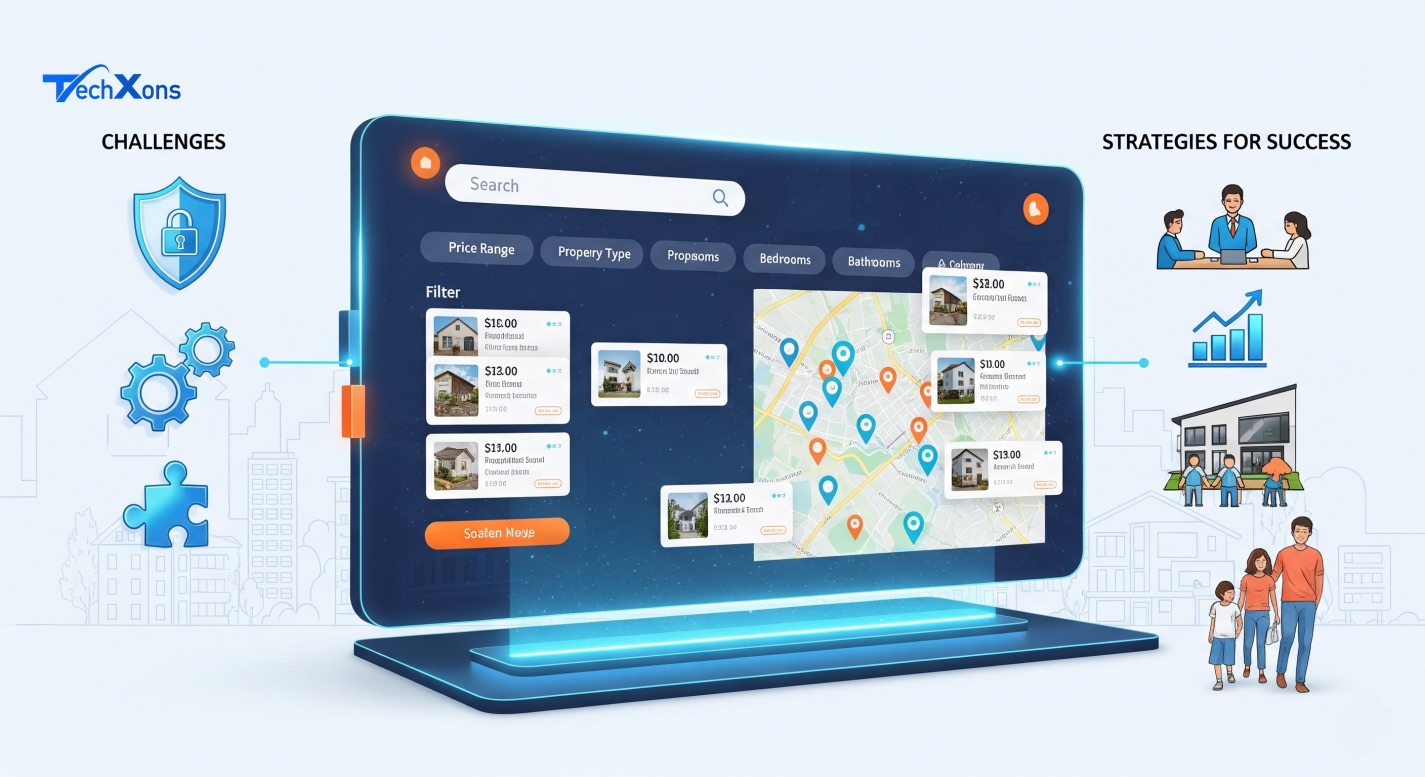
- By TechXons
- 07 Sep, 2025
- IT Consultancy
Revolutionizing Rentals: Airbnb's AI-Driven Horizon and Insights for Emerging Booking Platforms
This article explores Airbnb's evolution from a simple rental platform to a global leader, emphasizing its integration of AI for enhanced user experiences, pricing, safety, and personalization. It covers key features like Airbnb experiences, long-stay options, and local searches ("Airbnb near me"), while predicting future advancements such as hyper-personalized recommendations, sustainable integrations, and metaverse features. For rental startups, it offers insights on leveraging AI through solution clones like those from Techxons, including niche strategies, challenges, and implementation steps, aiming for organic growth in the competitive travel industry.
In the constantly changing world of hospitality and travel, there is a behemoth in the shape of Airbnb that is revolutionizing how we approach accommodation, experiences, and longer-term stays. As we move forward into the future, artificial intelligence (AI) will be the disruptor for booking platforms like Airbnb. This article discusses Airbnb's new advancements, the use of AI in its website, bold predictions of what comes next, and business advice for rental booking startups who want to leave their mark. Whether you are a tourist searching for "Airbnb near me" or an entrepreneur considering the business model of Airbnb, using AI is going to make booking smarter, more personalized, and incredibly faster.
For companies like Techxons, that are in the business of solution clones—regulated duplicates of successful platforms like Airbnb with enhanced features infused into them—these AI advancements make it possible to create competing, scalable duplicates. We're breaking down how AI is changing the business of Airbnb, enhancing Airbnb experiences, streamlining long stay Airbnb options, and more. You'll understand everything you need to understand about why AI is the way forward and how to apply it to startups in terms of organic growth and retention.
The Emergence of Airbnb: From Humble Beginnings to Global Dominance
Airbnb's history is one of innovation and disruption. It was started in 2008 by Brian Chesky, Joe Gebbia, and Nathan Blecharczyk. They began as a crude concept of renting air mattresses in their San Francisco apartment to conference attendees. It has grown to be a billion-dollar behemoth. Airbnb currently boasts over 7 million listings across over 220 countries and regions with millions of guests arriving every year.
In essence, the Airbnb business model is peer-to-peer sharing. Hosts list their homes—straight from apartments to villas—and travelers pay for their stays for a few days, a holiday, or even weeks. This disrupted the hospitality industry, making these non-traditional stays possible and even affordable. But what sets Airbnb apart is not the listings themselves; it is the trust, the community, and the tech-enabled ecosystem around it.
One of the most important pillars is Airbnb experiences, introduced in 2016, which stretches from providing mere stay to fully screened activities run by locals. From cooking classes in Italy to Rockies hikes, the experiences introduce a local touch of authenticity that turns an ordinary holiday into an unforgettable odyssey. To buyers who enter "Airbnb near me" in search engines, the geolocation function of the platform instantly calls up the relevant options, combining stay and local experiences in seamless harmony.
Long-term Airbnb listings have also become increasingly popular, particularly in the post-pandemic world. With the rising trend towards remote work, tourists look for stays of weeks or months, complete with discounts for longer bookings. The niche appeals to digital nomads, families temporarily moving, or any user looking for a home away from home. Such listings are favored by Airbnb algorithms so that they surface on user searches for amenities such as workspaces, full kitchens, and fast internet.
Airbnb is built on data—users' reviews, bookings, and feedback loops that power progressively improved recommendations. But with growing competition from established players such as Vrbo and Booking.com, and new entrants, Airbnb will need to innovate. That is where AI fits in: the trigger for the next growth cycle.
AI's Present Function in Airbnb: Enabling User Experience and Operations
Airbnb has been executing AI quietly but deeply in the recent past. Machine learning algorithms drive its search and recommendation tools, digging through massive amounts of data to recommend the ideal accommodation. When you search for "Airbnb near me," AI takes into account your location, previous reservations, reviews, and even season of the year to present you with customized results.
In pricing, Airbnb's Dynamic Pricing uses AI to enable hosts to maximize revenue. Demand, local activity, competitor rates, and past performance might all be factors in suggesting changes, maximizing revenue without overpricing listings. For the Airbnb business owner (host), that translates into fewer assumptions and more revenue.
Airbnb activity is also boosted by AI. The website uses natural language processing (NLP) to match user preferences with activities available. If you've rented a beach house, AI would recommend surf lessons or sunset cruises around there, and you have a complete travel experience.
Trust and security are most important in the Airbnb world. Artificial intelligence technologies such as risk scoring evaluate bookings for risks, monitoring for suspect activity to circumvent fraud. Computer vision examines images in listings to verify descriptions against images to prevent misrepresentation.
For long-term stay Airbnb reservations, AI anticipates user demand. AI can recommend staying with laundry or pet support facilities based on profile information. AI chatbots also manage customer support requests, answering queries such as check-in times or refund quickly.
AI operates in the background, streamlining processes. Predictive analytics predict peak demands, enabling Airbnb to boost server capacity. In marketing, AI segments customers for segmented marketing, improving conversion rates.
But wait, there's more. As AI grows, the future of Airbnb gets even brighter—aye, or rather, brighter?
Airbnb's AI Future: Revolutionary Changes Ahead
AI in the future will revolutionize Airbnb in deep ways. Below are some futurology predictions based on new trends and breakthroughs in technology.
1. Hyper-Personalized Suggestions and Virtual Walkthroughs
Picture yourself logging onto Airbnb and saying hello to an AI concierge familiar with you more than your travel agent. With sophisticated machine learning, Airbnb might be able to merge information from your social media pages, previous travels, and even wearable technology to provide super-personalized recommendations. Entering "Airbnb near me" might not only recommend listings but virtual reality (VR) tours with overlays from artificial intelligence providing such amenities as local attractions or sound levels.
For Airbnb experiences, AI would generate real-time itineraries. If you are food obsessed, it can provide a cooking class with market visit, changing in real time according to weather or demand and supply. Long-term stay Airbnb guests can be presented with AI-controlled relocation packages, such as co-working area or local gym membership.
Prediction: By 2027, 80% of reservations will have AI-powered personalization, enhancing user satisfaction and repeat reservations.
2. AI-Powered Pricing and Revenue Management
Dynamic pricing will turn into predictive revenue management. AI and dynamic pricing will predict shifts in the market using global data such as economic indicators or travel bans. Airbnb hosts might be sent AI recommendations on when to rent out properties or spend money on refurbishments.
For startup clones of Airbnb solutions, the integration of such AI tools through firms like Techxons can prove to be a trump card. Techxons offers solution clones with AI-powered pricing engines so that new platforms can compete on efficiency right from day one.
3. Enhanced Safety and Anti-Abuse
The role of safety will broaden for AI with biometric authentication. Facial recognition can verify arrivals, minimizing no-shows or unauthorized stays. NLP will scan reviews for nuanced cues, such as undercover complaints about hygiene.
In the post-AI world, Airbnb could leverage predictive analytics to spot possible conflicts in advance and act on them accordingly. This would reduce cancellation rates and create more trust.
4. Blending Sustainable Travel
Sustainability goes up. AI can rank listings by their eco-friendliness—energy usage, waste disposal—and select them for a search. For Airbnb long stay, AI would recommend carbon offsetting schemes or sustainable transport.
Airbnb experiences can address green-tourism with AI keeping low environmental expenditure. Startups entering this market can adopt AI for sustainability solutions to attract conscience-driven consumers.
5. Metaverse and Augmented Reality Experiences
The metaverse is no longer fiction. Airbnb might sell virtual properties within virtual worlds, with clients previewing real-life stays beforehand. AI avatars might provide tours, responding to questions in natural language.
For "Airbnb near me" searches, augmented reality (AR) apps might superimpose listing information over the camera view on your phone, indicating available listings as you stroll through a neighborhood.
Prediction: By 2030, AI-powered metaverse amenities might earn 20% of Airbnb's revenue from virtual experiences and bookings.
6. AI in Host Support and Community Building
The core of the Airbnb business is its hosts. AI may provide virtual mentorship, tracking performance analytics to provide recommendations for improvement. AI moderators may be used in community forums to enhance positive interaction.
AI for guests may help with social networks by pairing travelers of common interests to collaborate on Airbnb experiences.
Potential for Rental Booking Startups: Use of AI in the Airbnb Model
The Airbnb model is about to be cloned, particularly through the integration of AI. Entrepreneurs can start the market by targeting untargeted niches such as long term Airbnb luxury or geographically focused Airbnb experiences.
Techxons, being a solution clone leader, allows entrepreneurs to start Airbnb-like platforms in one go. Their clones have incorporated AI features for search, pricing, and recommendation, making startups operational straight away without development costs that make eyes water.
Niche Opportunity: Corporate Bookings and Long Stay Airbnb
With remote work on the rise, long stay Airbnb is a goldmine. Companies can target furnished apartments for professionals, leveraging AI to match corporate requirements such as proximity to offices or fast internet.
there are Best Long Stay Airbnb Options for Digital Nomads.
Revamping Airbnb Experiences with AI
Startups can distinguish themselves by over-dramatizing experiences. AI can be utilized to customize adventure bundles, partnered with local stakeholders. For example, an AI-powered chatbot can map out an entire day of affairs based on user interest, from breakfast venues in the mornings to nightlife engagements.
Local Optimization: Making the Most of "Airbnb Near Me"
When it comes to geo-targeted searches, they’re absolutely essential. Startups should really consider investing in AI-driven local SEO to ensure their app pops up in those "Airbnb near me" searches. Features like real-time availability maps, powered by AI, can turn casual browsers into eager bookers. Techxons' solution clones come equipped with geolocation AI, making implementation a breeze.
Building a Sustainable Airbnb Business Clone
Sustainability is a big selling point these days. AI can assist startups in tracking and promoting eco-friendly listings, which is a huge draw for environmentally conscious users. Imagine integrating carbon calculators into bookings—what a unique selling proposition that would be!
Marketing Strategies for Organic Reach
To climb the ranks, it’s all about focusing on keyword-rich content. Naturally weave in primary keywords like "Airbnb" along with some secondary ones. Long-form articles, like this one (aiming for around 4000 words), signal authority to search engines. Guest blogging, social media engagement, and backlinks from travel sites can really boost your reach.
For Techxons clients, the pre-built SEO tools in their clones automate a lot of this work.
Challenges and Ethical Considerations in AI Adoption
You can’t talk about the future of AI without addressing the challenges. Data privacy is a top priority; Airbnb needs to navigate regulations like GDPR while utilizing user data for AI. There’s also the risk of bias in algorithms, which could skew recommendations and favor certain demographics.
Startups should regularly audit their AI for fairness. Plus, there’s the concern of job displacement for human customer service reps, although AI does create new roles in data science. Ethically, AI in Airbnb experiences must be sensitive to cultural nuances, steering clear of commodifying local traditions.
For Techxons' solution clones, built-in ethical AI frameworks ensure compliance.
Case Studies: Successful AI Integrations in Similar Platforms
Take a look at Booking.com's AI chatbots, which handle a whopping 70% of inquiries, significantly cutting down response times. Vrbo leverages AI for photo enhancement, making their listings more attractive.
A startup like Sonder, which focuses on long-stay Airbnb-style apartments, uses AI for inventory management, resulting in impressive occupancy rates. Techxons has assisted numerous clients in replicating these successful strategies.
Implementing AI in Your Rental Startup: A Step-by-Step Guide
- Assess Needs: Identify pain points—search accuracy, pricing, safety.
- Choose Tools: Partner with providers like Techxons for ready-made AI-integrated clones.
- Data Collection: Gather user data ethically to train models.
- Test and Iterate: Roll out features like AI recommendations in beta.
- Scale: Use AI analytics to expand listings and experiences.
For "Airbnb near me" optimization, integrate Google Maps API with AI overlays.
The Road Ahead: AI as the Cornerstone of Travel Innovation
As Airbnb pioneers AI, the ripple effects will transform the industry. Predictions point to a seamless, intuitive future where bookings feel magical.
For startups, the message is clear: embrace AI or risk obsolescence. Companies like Techxons make this accessible, offering solution clones that embed AI from the start.
Whether exploring Airbnb experiences, securing a long stay Airbnb, or simply finding "Airbnb near me," AI ensures every interaction is optimized.
In conclusion, the Airbnb business is on the cusp of an AI revolution. By staying ahead, startups can not only compete but thrive in this dynamic space.





